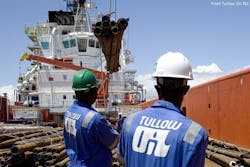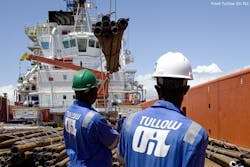Tullow’s TEN project nears completion offshore Ghana
The Tullow Oil PLC-operated Tweneboa-Enyenra-Ntomme (TEN) project offshore West Africa is now 96% complete and expected to begin oil production within 3-6 weeks. Nearby offshore Ghana, the firm is developing a long-term oil offtake solution at Jubilee field following an issue with the floating production, storage, and offloading vessel’s turret bearing.
Nearing completion at the TEN project is hook-up and commissioning of the Prof. John Evans Atta Mills FPSO, which entails connecting the predrilled wells to the vessel via subsea systems. During July, the integrated startup sequence is expected to be initiated with water injection to the Enyenra reservoir, which will be followed by oil production. The same sequence will then be repeated for the Ntomme reservoir.
A gradual ramp-up in production towards the FPSO capacity of 80,000 b/d is anticipated around yearend as the facilities complete performance testing and wells are brought up to optimum rates. Tullow estimates that TEN average annualized production in 2016 will be 23,000 b/d gross (11,000 b/d net).
Drilling is not expected to recommence on the field until after resolution of the Ivory Coast-Ghana border dispute through the International Tribunal for the Law of the Sea, whose decision is expected in late 2017.
Associated gas produced at TEN will be reinjected into the Ntomme reservoir gas cap until gas export begins. Gas export was planned to start 12 months after field startup, with the Tweneboa gas reservoir coming on stream 12 months later. However, options to accelerate gas export are being evaluated as fabrication of the gas export facilities is ahead of schedule and expected to be complete in late 2016.
Improving offtake at Jubilee
The Kwame Nkrumah FPSO, whose malfunctioning turret bearing caused output to be shut in March from Jubilee field offshore Ghana, has completed 18 offtakes using a dynamically positioned shuttle tanker since production resumed in May (OGJ Online, May 9, 2016). Tullow expects to continue operating the field under the new procedures for the remainder of the year and anticipates average gross production to be about 85,000 b/d of oil in the second half.
As a preferred long-term solution, Tullow and its partners now envision converting the FPSO to a permanently spread moored facility, with offtake through a new deepwater offloading buoy. The partners are working with Ghana’s government for approval of the change.
The first phase of the work will involve the installation of a stern anchoring system to replace the three heading control tugs currently in the field, which is anticipated to be completed by yearend and will require short periods of reduced production.
Tullow then plans a second phase of work to rotate the FPSO to its optimal spread moor heading in first-half 2017. The work program covering these phases is expected to cost $100-150 million gross, and it’s estimated that the Jubilee FPSO will need to be shut down for 8-12 weeks during first-half 2017.
Upon completion of the spread mooring work program in mid-2017, the partners will review opportunities to improve offtake procedures, which may include the use of a larger dynamically positioned shuttle tanker, and seek to return production to levels from before the turret issue occurred. The additional gross operating expenditure of the revised procedures is expected at $115 million for 2016 and $80 million for 2017.
A deepwater offloading buoy is anticipated to be installed in first-half 2018, removing the need for the dynamically positioned shuttle and storage tankers and the associated operating costs.
In the first half, Tullow’s West Africa working interest oil production averaged 51,900 b/d, below previous guidance due to lower output from Jubilee. As a result, the firm has revised its oil production guidance range in the region to a net 62,000-68,000 b/d of oil.

